#utena media
Explore tagged Tumblr posts
Text




December 1997 saw Revolutionary Girl Utena come to its finale, and the anime magazines of the era were hyped to hype it! Newtype gave it the December cover and first pages, with multiple spreads of new art and analysis!
As I always do, I also scanned other Utena-relevant pages! The voice actress Christmas party has some familiar faces, including Tomoko Kawakami, Yuka Imai, and Kotono Mitsuishi! The episode guide and ratings list, as I've done for Newtype's entire 1997 run, are also here. My strange devotion to scanning the adverts and merchandise pages continues, as does the steady stream of VINTAGE FANARTS!
If you're wondering about the NEW MUSICAL DROPPING AT THE END OF 1997, there's an announcement here, also!! (We mean this one!)
Finally, Utena and her new cover art feature in the month's extra bonus Christmas labels!
If you like absolute loads of Utena magazine scans, the Bibliothèque is the place for you! And if you want to join our happy little FORUM, Something Eternal, you can come watch the final three episodes of Revolutionary Girl Utena with us in our weekly watch thread!!!
#revolutionary girl utena#rgu#sku#shoujo kakumei utena#newtype#newtype magazine#utena meta#utena media#utena fandom#empty movement#utena#anthy#anime magazines
232 notes
·
View notes
Text
Gendered pronouns in Japanese vs English
In Revolutionary Girl Utena, the main character Utena is a girl (it says so in the title), but very conspicuously uses the masculine first person pronoun 僕 (boku) and dresses in (a variation of) the boys school uniform. Utena's gender, and gender in general, is a core theme of the work. And yet, I haven’t seen a single translation or analysis post where anyone considers using anything other than she/her for Utena when speaking of her in English. This made me wonder: how does one’s choice of pronouns in Japanese correspond to what one’s preferred pronouns would be in English?

There are 3 main differences between gendered pronouns in Japanese vs English
Japanese pronouns are used to refer to yourself (first-person), while English pronouns are used to refer to others (third-person)
The Japanese pronoun you use will differ based on context
Japanese pronouns signify more than just gender
Let’s look at each of these differences in turn and how these differences might lead to a seeming incongruity between one’s Japanese pronoun choice and one’s English pronoun choice (such as the 僕 (boku) vs she/her discrepancy with Utena).
Part 1: First-person vs third-person
While Japanese does technically have gendered third person pronouns (彼、彼女) they are used infrequently¹ and have much less cultural importance placed on them than English third person pronouns. Therefore, I would argue that the cultural equivalent of the gender-signifying third-person pronoun in English is the Japanese first-person pronoun. Much like English “pronouns in bio”, Japanese first-person pronoun choice is considered an expression of identity.
Japanese pronouns are used exclusively to refer to yourself, and therefore a speaker can change the pronoun they’re using for themself on a whim, sometimes mid-conversation, without it being much of an incident. Meanwhile in English, Marquis Bey argues that “Pronouns are like tiny vessels of verification that others are picking up what you are putting down” (2021). By having others use them and externally verify the internal truth of one’s gender, English pronouns, I believe, are seen as more truthful, less frivolous, than Japanese pronouns. They are seen as signifying an objective truth of the referent’s gender; if not objective then at least socially agreed-upon, while Japanese pronouns only signify how the subject feels at this particular moment — purely subjective.
Part 2: Context dependent pronoun use
Japanese speakers often don’t use just one pronoun. As you can see in the below chart, a young man using 俺 (ore) among friends might use 私 (watashi) or 自分 (jibun) when speaking to a teacher. This complicates the idea that these pronouns are gendered, because their gendering depends heavily on context. A man using 私 (watashi) to a teacher is gender-conforming, a man using 私 (watashi) while drinking with friends is gender-non-conforming. Again, this reinforces the relative instability of Japanese pronoun choice, and distances it from gender.

Part 3: Signifying more than gender
English pronouns signify little besides the gender of the antecedent. Because of this, pronouns in English have come to be a shorthand for expressing one’s own gender experience - they reflect an internal gendered truth. However, Japanese pronoun choice doesn’t reflect an “internal truth” of gender. It can signify multiple aspects of your self - gender, sexuality, personality.
For example, 僕 (boku) is used by gay men to communicate that they are bottoms, contrasted with the use of 俺 (ore) by tops. 僕 (boku) may also be used by softer, academic men and boys (in casual contexts - note that many men use 僕 (boku) in more formal contexts) as a personality signifier - maybe to communicate something as simplistic as “I’m not the kind of guy who’s into sports.” 俺 (ore) could be used by a butch lesbian who still strongly identifies as a woman, in order to signify sexuality and an assertive personality. 私 (watashi) may be used by people of all genders to convey professionalism. The list goes on.
I believe this is what’s happening with Utena - she is signifying her rebellion against traditional feminine gender roles with her use of 僕 (boku), but as part of this rebellion, she necessarily must still be a girl. Rather than saying “girls don’t use boku, so I’m not a girl”, her pronoun choice is saying “your conception of femininity is bullshit, girls can use boku too”.

Through translation, gendered assumptions need to be made, sometimes about real people. Remember that he/they, she/her, they/them are purely English linguistic constructs, and don’t correspond directly to one’s gender, just as they don’t correspond directly to the Japanese pronouns one might use. Imagine a scenario where you are translating a news story about a Japanese genderqueer person. The most ethical way to determine what pronouns they would prefer would be to get in contact with them and ask them, right? But what if they don’t speak English? Are you going to have to teach them English, and the nuances of English pronoun choice, before you can translate the piece? That would be ridiculous! It’s simply not a viable option². So you must make a gendered assumption based on all the factors - their Japanese pronoun use (context dependent!), their clothing, the way they present their body, their speech patterns, etc.
If translation is about rewriting the text as if it were originally in the target language, you must also rewrite the gender of those people and characters in the translation. The question you must ask yourself is: How does their gender presentation, which has been tailored to a Japanese-language understanding of gender, correspond to an equivalent English-language understanding of gender? This is an incredibly fraught decision, but nonetheless a necessary one. It’s an unsatisfying dilemma, and one that poignantly exposes the fickle, unstable, culture-dependent nature of gender.

Notes and References
¹ Usually in Japanese, speakers use the person’s name directly to address someone in second or third person
² And has colonialist undertones as a solution if you ask me - “You need to pick English pronouns! You ought to understand your gender through our language!”
Bey, Marquis— 2021 Re: [No Subject]—On Nonbinary Gender
Rose divider taken from this post
#langblr#japanese#japanese language#language#language learning#linguistics#learning japanese#utena#revolutionary girl utena#shojo kakumei utena#rgu#sku#gender#transgender#nonbinary#trans#official blog post#translation#media analysis
3K notes
·
View notes
Text
A guide to Arcane referencing sapphic media!
Revolutionary Girl Utena


The Legend of Korra


Adventure Time


Steven Universe


(Ps: this is just for fun 😉)
#arcane#arcane season 2#caitlyn kiramman#caitvi#vi arcane#violyn#sapphic media#sapphics we won#vi x caitlyn#steven universe#adventure time#bubbline#korrasami#the legend of korra#revolutionary girl utena#utena tenjou#anime#sapphic representation#lgbt+#queer animation
202 notes
·
View notes
Text
safe and soundless
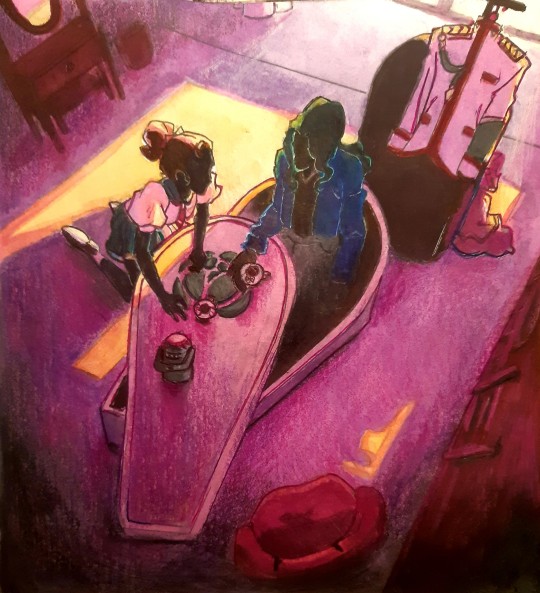
#revolutionary girl utena#rgu#wakaba shinohara#saionji kyouichi#(and his coffin)#traditional art#watercolor#colored pencils#alcohol markers#mixed media
2K notes
·
View notes
Text

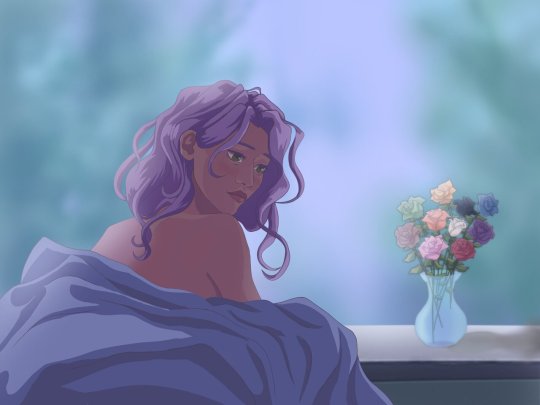
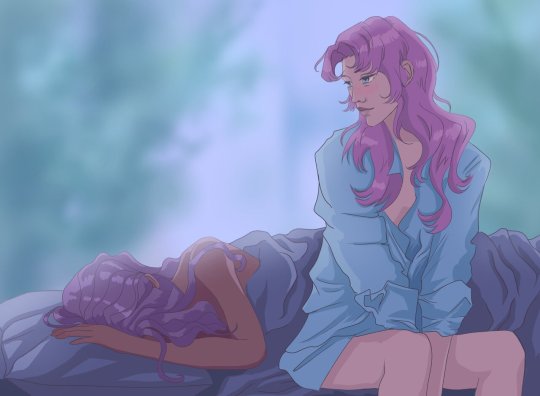
"You're a light, stop worrying/ Throw yourself into that darkness" - Yoojung (OnlyOneOf) 'begin'
"And someday, together, we'll shine" - Revolutionary Girl Utena Ep. 39
#yet another crossover between OOO and my other favorite gay media#the idea came to me randomly and I had to draw it#no idea if there is fandom overlap other than me though#revolutionary girl utena#shoujo kakumei utena#rgu#rgu fanart#utena fanart#himemiya anthy#tenjou utena#anime fanart#onlyoneof#onlyoneof fanart#artchoerim
480 notes
·
View notes
Text
Something about I saw the tv glow and revolutionary girl utena both using coffins/graves as a literary device drives me crazy. Like your in the coffin. your in the grave. Everyone knows somehow. You could leave. but also you can’t. and your dying. Your friend has come a long way back to where it all started to get you. But you still can’t. And now your both changed. but you are still also the same as you always were. And you are still apologizing in the end.
#idk I’m going crazy thinking of parallels in the media I love#rgu#I saw the tv glow#revolutionary girl utena#queer media with heavy physical metaphor my beloved#it’s about the knowing and the touching a hot burner reaction of knowing and about the apologizing
155 notes
·
View notes
Text


380 notes
·
View notes
Text
The Lesbian Cycle
Rose of Versailles (special mention) inspired Sailormoon, which inspired Utena, which inspired Madoka and Genshin (In terms of Ei and Miko) <3
"Oh but how is Ei and Miko a reference?!" Color scheme, purple pink lesbian. Raiden drawing the sword from her chest is a direct Anthy reference. There is an achievement in game titled "virtual star embryology" which is the name of Saionji's Apocalypse Arc Duel Song... so Genshin definitely has Utena references.
(I'm a little too hyperfocused on all these things help)
#revolutionary girl utena#utena x anthy#utena revolutionary girl#genshin impact fatui#genshin impact#ei x miko#raiden ei#yae miko#puella magi madoka magica#madoka kaname#homura akemi#the rose of versailles#lady oscar#versailles no bara#anime edit#edit#anime#sailor moon#sailor uranus#sailor neptune#sapphic#Lesbians in media
102 notes
·
View notes
Text
It's June, it's 1997...
....and you've been following Revolutionary Girl Utena. Maybe a little casually. But yesterday, episode 12 dropped, and you watched Utena TAKE HERSELF BACK and you take your ass to the hobby store and stock up on-HOLY SHIT AN ENTIRE UTENA SUPPLEMENTAL IN THIS MONTH'S ANIMAGE???? IN ENGLISH????






That's right! Nagumo translated and I scanlated The Utena Dossier, a 36 page supplement with character sheets, massive interviews, comics, and more!!! (The interviews are so long I also made them into website pages, and also the entire thing can be downloaded as a PDF.) Or, you can view the whole thing in the gallery section of Something Eternal, our happy little forum!
Curious about what else dropped in June? I have a summary post about that in our watch thread!!!
Sorry about the lack of posts, I (Vanna) have been absolutely crushing the final stretch of a MASSIVE project I took on over a year ago--the Duelist Bible. This was only 36 pages. The Duelist Bible? That fucker doesn't drop until September 1997, but it also has 100. Some real print media history coming your way soon, stay tuned!!!
(Also, yes, I do mean to stream the musicals soon coming up, we're just kinda ironing out some hardware stuff.)
995 notes
·
View notes
Text
Fansub Release + Analysis of Utena Ep 14
This is a big one!!

My fansub release posts aren't usually like this, but this episode is so jam packed with stuff I want to talk about that I had to write my translation notes as a series of essays. It's longer than usual so strap in!
First, a word on “The Mikage Seminar”
I’ve always found the translation “the Mikage Seminar” very strange. In English, a seminar is an event — a lecture. Yet “the Mikage Seminar” is discussed as though it’s not a recurring lecture, but a society or a school of therapy, or a cult (like scientology). In fact I did a bit of reading about scientology to try and find an alternative translation, and discovered that the origins of scientology, namely a set of ideas and practices called Dianetics, bears a lot of similarities to “the Mikage Seminar”. Both involve a type of therapy where one person looks into their mind and talks to an “auditor”.
The auditor coaxes the preclear to recall as much as possible. — Wikipedia
This in particular stood out to me! Mikage often says 「深く。もっと深く」 during his interviews (”Deeper. Dig deeper.”).
The Japanese word ゼミナール doesn’t actually come from the English “seminar” but the German “Seminar” (capitalised). According to Wikipedia, in Germany, and often in Japan, Seminar/ゼミナール is used to refer to a university course that includes a thesis project. So ゼミナール refers to a course of learning, rather than a talk or lecture. And it would make a lot of sense to call a system like Dianetics a “course”. Almost like a “course” of medicine — a “course” of psychological practices that you can join but never complete.
So it would make sense to translate it as “the Mikage Course”. But “course” has more meanings in English than just this, and in the context of a university this makes it sound more like a mundane teaching course. So I tried some other words: the Mikage Sessions, the Mikage Method, Mikage Psychotherapy, Mikage Therapy, the Mikage Movement. None seemed quite right. Until I remembered this post. ゼミナール is a foreign word in Japanese, why not find a foreign word for the translation? And so I settled on this:
The Mikage Seminarium, AKA The Society of the Black Rose…
Seminarium is Latin, and is where both the German and English derive seminar from. Its original meaning is “seed plot”, but it’s also just the Polish word for seminar. I really like how the Latin makes its meaning ambiguous — it kind of sounds like a location, kind of sounds like a society, and kind of sounds like a learning course. Because it is all of these things.


Anthy: では、香苗さん。失礼します。 Kanae: ね、あたしの事、お姉さんって呼んでいいのよ。もうすぐわたしはあなたの本当のお姉さんになるんだから。
A more literal translation:
Anthy: Thank you for having us, Kanae-san. Kanae: Please… you can just call me “sister”. I’m going to be your real sister soon enough anyway.
The translation I ended up going with:
Anthy: Thank you for having us, Miss Ohtori. Kanae: Please... you can just call me Kanae. We're going to be family soon. There's no need for the formalities.
Japanese honorifics strike again!
In English, sisters-in-law don’t ask to be called “sister”. That would be super weird in most scenarios, and this scene is trying to evoke a particular familiar feeling of closing a distance gap in a relationship. The audience is meant to relate. Changing how Anthy addresses Kanae was pivotal to this scene working properly.


わかりました。あなたは世界を革命するしかないでしょ。
I understand. Your only choice is to force the world to change around you.
This line is translated as “Your only choice is to revolutionise the world” by basically every other translation. The reason is clear — the Japanese is the same as when Utena pulls the sword out of Anthy, or when any of the other characters talk about “revolutionising the world”. However, in this context, I don’t like it. The nuance of the English phrase is quite different to the Japanese phrase. In English, it’s often used to describe new commercial products: “This new device will revolutionise the world!” It comes with an implied “for the better”, but has used to describe technological developments so unexciting that it can also feel hollow. When the student council talk of revolutionising the world, they sound like revolutionaries — the context makes it work. But in this context, it comes out of nowhere and doesn’t have any of that fervour, which makes it sound hollow and flaccid when it should sound sinister and manipulative.
I think a pervading throughline for all the Black Rose duelists is that they see their problems as caused by other people, with themselves being blameless. Rather than change how they approach their situation, Mikage tells them they’re in the right.
Your behaviour will set you down a path. If that path leads to your goals, well done! However, if your path does not lead to your goals, there’s only two ways you can achieve them.

The first is to change your behaviour so that it does align with your goals. The second, impossible way, is for the rest of the world to change such that your current path DOES end up leading to your goals. This second way is not possible in the real world. But it is possible in Utena.

Also I’ll just leave this here: “around you” → “revolve” → “revolution” 👀
Kanae tried to build a relationship with Anthy in a passive, non-confrontational, extremely Japanese way — the way she has been taught to behave, the “proper” way, a mechanical following of the social scripts. We don’t see a lot of their relationship, but the way she behaved and spoke of behaving towards Anthy is very very similar to the way my Japanese grandmother has behaved towards my and my brother’s partners.
It was unthinkable to her to change this pattern of behaviour. Her only choice was to change Anthy, change the rest of the world, so that her behaviour would lead to the outcomes she wants. You could describe this forceful bending of reality to be “revolutionising the world”.


この黒薔薇のある限り、私はこれから嘘の私を演じなくて住む。
As long as I have this Black Rose, I'm free from the lie I was living before.
Besides gender, growing up, and resisting change (which exist as separate themes but also all intertwine as one), another major theme present in Utena is the self and subjective reality. The self is explored within those first major three themes, but also in terms of how the self dictates reality with the Black Rose duellists.
Black Rose Kanae says that her past self was a lie.
It reminds me of all the times when I’ve been going through a personal trial and I’ve looked back on my past self and thought “How naive I was. I understand things better now.” And then after a while I realise I was wrong, and my first self was more right. And then later still, maybe I re-realise that the second self was more right! And so on! The reality of truth (or to use Kanae’s language, “lies”) is so subjective.
Who dictates knowledge production? Who decides what is true; what is valid knowledge? This is a question of sociology - and at the moment that answer is "science does, kinda". But science and academic systems are supported by capitalist structures and tainted by capitalistic incentives — needing to be published in a journal, issues of replicability, the barrier to entry into academia in the first place, etc, etc. In the future we may find our current way of organising knowledge to be archaic and primitive in the same way we look back at medieval scholars.
But what about organising self-knowledge? Knowledge where the only one who can really decide what is true is yourself. And the only one that can decide what yourself even IS is yourself. I feel like I have looked back on my old ways of conceptualising myself many times (not even counting the gender-based revelations) and thought it primitive and archaic, and NOW I truly understand who I am and how to think of myself and how my thoughts interact with my other thoughts. But I have no doubt that I’ll look back on this current self of mine and reject their way of thinking too.
After their heart is replaced by the Black Rose, the duellists themselves frame this change as a moment of self realisation, of clarity. Once the rose is inside them, they wake up from themselves, like I have countless times. Kanae says herself, “This is the true me.” Honestly, I don’t doubt it. I think that version of Kanae was her true self at that moment, given the things influencing her. Being brainwashed doesn’t make you less of a person, or less yourself. It just makes you organise your reality differently.


心を凍結させて作っただけの間に合わせのデュエリストでは、彼女は破れないな。
We won't be able to defeat her by simply freezing someone's heart and forcing them to duel.
Anya and I discussed this in depth. I originally translated 心 as “mind”, because that was the first thing that popped into my head and I thought that was the simple part of the translation. However, Anya pointed out that it didn’t make sense with the themes of self and subjective reality, and I strongly agreed, so I changed it to “heart” instead.
Anya suggested “conscious mind” instead of “heart” but I think heart is more accurate. 心 (kokoro) can mean heart or mind in Japanese (I find it interesting that those two things are portrayed as opposites in English), and that kanji is found in the word for biological heart, 心臓 (shinzou). When they say of the Black Rose "This is your new heart" they use 心臓. They also say "Your new 命 (life/lifeforce)" which I translated as soul since it sounded more hardcore and because "your new life" is a set phrase in English meaning a new chapter in your life rather than your life force. I think the idea is that they're freezing the duellists' ability to love and feel empathy, which in my opinion is necessary for them to commit to the unbelievably selfish act of revolutionising/reconstructing/bending the entire structure of the world for their own convenience.

A very special thanks to @dontbe-lasanya for being there to talk through all these themes and ideas. I'm incredibly proud of this episode's translation and I wouldn't have been able to do it without them.
If you want to see more analysis like this, let me know! And also follow this blog to see episodes of the fansub as they're released. You can find all episodes released so far here:
Rose divider taken from this post
#revolutionary girl utena#rgu#shoujo kakumei utena#sku#utena#media analysis#utena analysis#translation#japanese#japanese language#langblr#official blog post#utena fansub
166 notes
·
View notes
Text
Watching straight people enjoy sapphic and queer media is always both hilarious and frustrating.
I was there in the trenches for Korra and Asami. I remember watching every moment they had together in season 3 and 4 and seeing them get closer and closer. Every glance and line of dialogue between convinced me they were in love with each other. Then the final scene happens and the HOLD HANDS and I practically ascended! Confirmed by the creators shortly after that they wished they could develop it further but Nickelodeon had said no. But it was okay… cuz I SAW it! I could tell what they were trying to do through the restrictions of the censorship at the time.
Straights: “Well that came out of nowhere.”
I was there when Marceline sang her angsty song about princess bubblegum and wanting to suck the red from her face. I saw Bubblegum wearing Marceline’s band T-shirt as pajamas and straight up SNORTING AND SNIFFING IT. I saw that moment when Bubblegum gave up her T-shirt and the witch said it’s sentimental energy was through the roof! I remember Marceline being confused about hunger and love. So when in the final episode they finally kiss I leapt for joy!
Straights: “Well that came out of nowhere.”
Fuck, even when a show like Arcane has multiple queer characters in it. I CLOCKED the soft and romantic way Viktor said his name to Jayce in episode 2. My heart skipped a beat when Vi pinned Caitlyn against the wall. I was kicking my feet with glee when I saw Caitlyn and Vi doing the 69 Revolutionary Girl Utena bed pose on Caitlyn’s bed in episode 8. I had to get up and run around the room when Caitlyn and Vi started making out in the cell. Like I knew it was coming but the fact it happened still surprises me to this day. I feel like I’m floating on air!
Straights: “Well that came out of nowhere.”
It’s like OH MY GAWD how are you guys this unobservant? You can have two characters literally having sex and they’d be all like “they’re just good friends!” It’s AMAZING.
#arcane#arcane season 2#caitlyn kiramman#caitvi#violyn#vi#vi arcane#revolutionary girl utena#Utena#korra x asami#korrasami#the legend of korra#bubbline#princess bubblegum#marceline#adventure time#queer media#sapphic
352 notes
·
View notes
Text
Their Veneration of Her ꒰ა 🥀໒꒱
Mixed Media Painting, 2025 🗡️
⭑ . ₊ ⊹.₊๋• ✧༺. ♱ 🥀🕯️ 🥀♱ .༻✧ • ‧₊ ˚ ࣭ ⭑

#revolutionary girl utena#anthy himemiya#rgu#rgu fanart#shoujo kakumei utena#utena fanart#anthy fanart#collage#mixed media#mixed media artist#revolutionary girl utena fanart#rgu anthy#localmagicalgothart
34 notes
·
View notes
Text
If you think RGU condones pedophilia and/or incest you’re not media literate at all
34 notes
·
View notes
Text
Regarding Touga's age in flashbacks
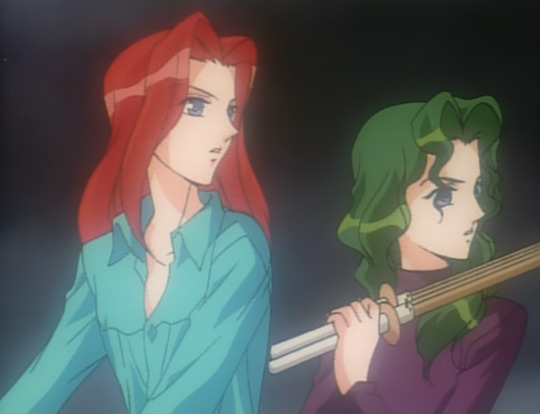
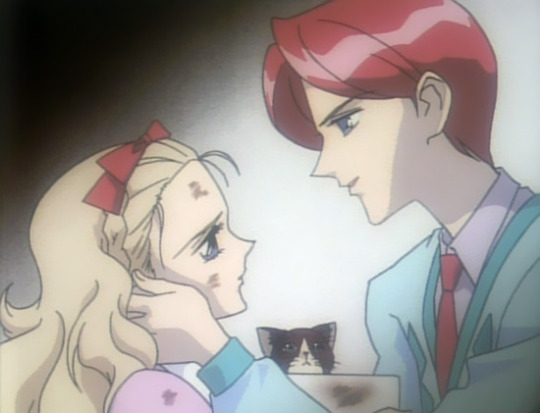
Touga appears as a child in two significant flashbacks in the series: in episode 9 where he and Saionji find Utena hiding in a coffin after she just lost her parents, and in episode 10 where Nanami gives him a kitten for his birthday, with all that that ended up tragically entailing. (It may be worth noting at this early point that neither of these flashbacks are from Touga's own point of view; ep 9's is Saionji's memory of the event, and ep 10's is of course Nanami's memories.)
The assumption I've seen throughout the entire fandom is that Touga is younger in Nanami's flashback, in which he has short hair, and a bit older in the coffin flashback, in which he has long hair. It's a perfectly reasonable and logical assumption, and one that I wouldn't question either -- if not for two things.
The first of those two things is head writer Enokido's notes on Touga; to sum them up very briefly for those who don't already know, they say his unpleasant backstory as depicted in the movie was also intended to have been his series self's backstory, with some additional details included to account for Nanami and Saionji. A specific point from both these notes and the movie itself is that Touga was ordered by his original parents to grow his hair out, as that was what Mr Kiryuu wanted. If we take Enokido's comments on Touga's backstory as applicable to the series canon -- as I personally do, as it heavily informs my entire reading of Touga as a character -- then they need to be reconciled with what's depicted in the series itself in one way or another.
The second thing is simply that I noticed some curiosities in the series character design sheets, which I'll go into past the readmore. Before that, I just want to pose the question I'm exploring here in the first place:
Could Touga have actually been younger in the coffin flashback than in Nanami's flashback?
Please note that this is more of a thought experiment than anything; I'm not trying to push this as The Actual Canon Truth, even if this does inform my personal headcanons regarding Touga's (and Nanami's and Saionji's) history. I just want to put forward some bits of evidence with my own thoughts and speculation on them. Without further ado...
First up, here's one of the design sheets for Touga and Nanami as kids from ep 10's flashback:

It says that Touga was 12 and Nanami was still 7 (keeping in mind that her birthday is a couple of months after his). I personally think they both look a bit younger than those stated ages, but I digress.
It could possibly be said that whoever added the notes on these design sheets might be pulling the characters' childhood ages out of thin air, but evidence that Touga is intended to be 12 here did make it into the episode itself:
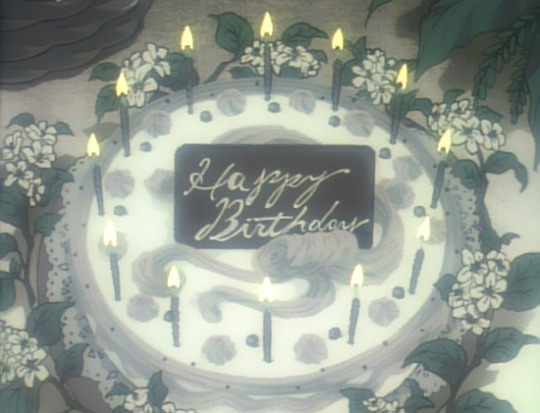
Twelve candles on a cake for a kid's 12th birthday would make a lot of sense.
Meanwhile, here's the full-body design sheet for Touga and Saionji as kids from ep 9's flashback:

This one doesn't give any ages for the boys; I'm mainly posting it here for the sake of comparison. Your mileage may vary on which version of child Touga looks older or younger, and I'm a little back-and-forth on the matter myself; that said, it does strike me how dainty he looks in the design sheet for the coffin flashback, though I wonder if it might just be because of his clothes.
What had me questioning Touga's (and Saionji's) age in the coffin flashback in the first place is that, in the manga, it's stated that Utena was 6 years old when her parents died. That would've made the boys about 9 at the time, as they're three years older than her. Having said that, though, the manga and anime are different continuities with different takes on a lot of things, so just because the manga says one thing doesn't mean it definitely applies to the anime version as well. So how old was child Utena in the anime, then?

As with the boys, the design sheet for Utena's appearance in the coffin flashback doesn't specify an age for her, either. This would ostensibly make their ages at the time ambiguous -- but I'm not giving up here. There's another character who was a similarly-aged child at the time.

Anthy appears as a child in flashbacks in episode 34, one of which takes place very shortly after ep 9's coffin flashback. According to the design sheet, she was 7 years old at the time, and she's noted to be the same height as child Utena. Therefore, I find it reasonable to conclude that Utena was also about 7 years old when she lost her parents, which would've made Touga and Saionji around 10 at the time.
That's the evidence I'm putting forward to support the possibility of Touga being younger in the coffin flashback than in Nanami's flashbacks, with the admitted underlying assumption that the design sheets can be used as reliable sources for characters' ages as children. I think it would address discrepencies in his hair length with regards to his backstory as given by Enokido, but there's still a couple of other things that ought to get a closer look in that case.
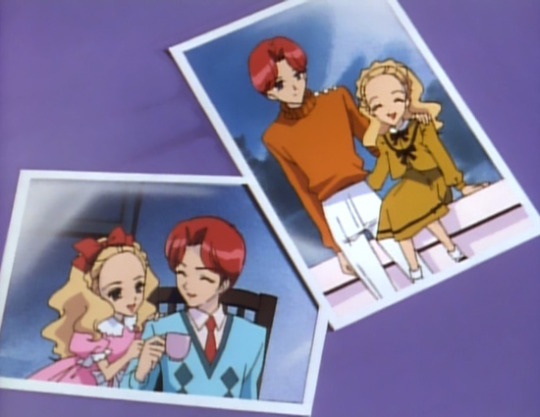
All of Nanami's childhood photos of herself and Touga that we see in episode 31 show him with short hair. What's with that?
My speculation on this is that Touga deliberately curated the photo album so that it would only show him with short hair as a kid, in order to hide the reality of his and Nanami's situation as "adopted" kids sold to a paedophile from her. It probably helps that in all these photos, he and Nanami look roughly the same as they did in her flashback in ep 10, suggesting that they could all be from around that time. I've also considered the possibility that there could be some Mamiya-esque shenanigans surrounding the photos (in that they're showing a falsehood, like the photo of the fake Mamiya that turns into one showing his real self during Mikage's duel), but that feels like too much of a stretch to me.
It's also possible that Nanami might be misremembering Touga's hair length in her flashbacks in the first place; the Kaoru twins offer precedent for this, as their "Sunlit Garden" flashbacks in episode 5 show Kozue with a completely different hairstyle depending on whether it's Miki or her remembering that time. Personally, though, I find it more likely that Touga really did have short hair at the time, especially if we assume from everything I gave further up in this post that he'd just turned 12. Apologies for the horrible following thought, but I wonder if, by the time Touga had reached that age, he was getting a bit too old for Mr Kiryuu's sick tastes...
Putting that nastiness aside, there's one more flashback involving Touga I want to talk about, and it's one I wouldn't even have thought to include if I hadn't rewatched the episode it appears in recently: Tsuwabuki's flashback from episode 6! (Always leave it to the comedy episodes to surprise you!)
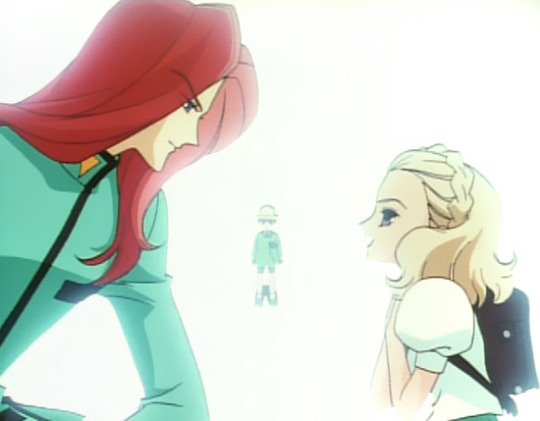
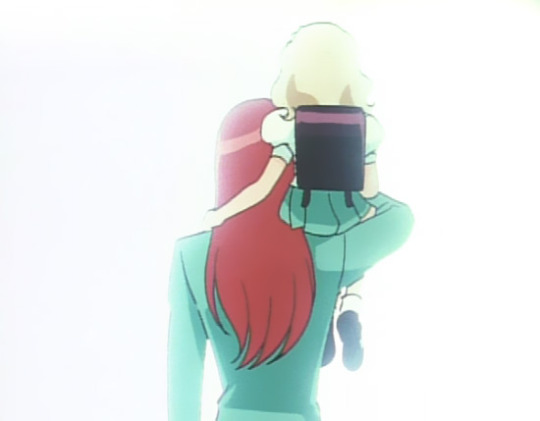
Tsuwabuki is presumably in preschool here based on his clothes, Nanami is in the girls' elementary school uniform, and Touga is in the standard boys' uniform as worn by middleschoolers and highschoolers. For all this to line up, I think their most likely ages here are 5-6 for Tsuwabuki, 8-9 for Nanami (putting her in third grade) and 12-13 for Touga (putting him in seventh grade, or his first year of middle school as per the Japanese school system).
Yet Touga has long hair here! If he had short hair when he'd just turned 12, how could it have grown out so much in only a year or so? (To say nothing of the growth spurt he seems to have had in that time...) I could chalk things up to Tsuwabuki idealising him as a big strong older brother in his memory -- middle school Touga apparently fought off a great big rampaging bull, after all -- which would explain why he looks basically the same here as he does as a highschooler. That said, Touga doesn't necessarily need to have had long hair in order for Tsuwabuki to idealise him the way he does; I doubt his hair length matters too much either way for that, so I don't see any reason for Tsuwabuki to misremember his hair in particular. This could lend some credence to the idea that Nanami misremembers Touga's hair length in her own flashback, but I question that for the reasons I already gave further up.
(As an aside: it might just be a matter of the lighting in that specific shot, but had Touga already dyed his trademark lighter streak in his hair in Tsuwabuki's flashback? He noticably doesn't have his highlight in either of the flashbacks with him as a child, which the design sheets for both of them make a specific point of noting. I might talk about the possible significance of his highlight in a different post.)
I think that's about it for my rambling and speculation on this, at least for now. What do you think? Is any of this plausible? Not plausible? Is it at least an interesting thought experiment to read about either way, or is it just a load of codswallop? Are there any blind spots I might've missed that I ought to address? Any other questions or comments? I'm curious to know.
#revolutionary girl utena#touga kiryuu#all screenshots and design sheets used here are from ohtori.nu as ever#big shoutout to them!#hooray for fandom resources! hooray for media preservation!#spoilers#csa mention /#long post#gala's meta
75 notes
·
View notes
Text
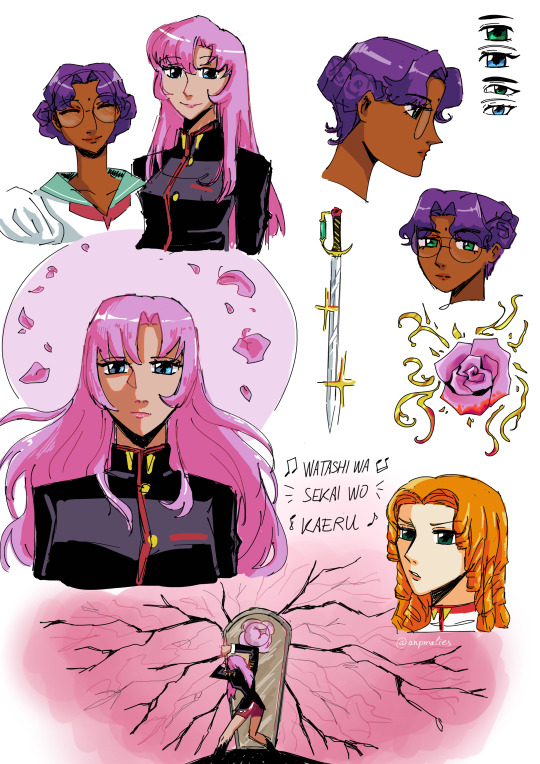
some colored utena doodles
[ID: A spread of colored digital drawings on a white background. In the left corner are anthy and utena, smiling at the viewer like their picture is being taken. Below it is a bust drawing of utena looking solemn with rose petals flying around her. On the bottom of the drawing is a redraw of utena opening anthy's coffin with cracks forming all around the pink background. Around the canvas are some miscellaneous sketches of anthy, juri, a rose and a sword. End ID.]
#utena#rgu#utena fanart#rgu fanart#revolutionary girl utena#anthy himemiya#utena tenjou#kygdraws#my artstyle goes all crazy whenever i watch a new media bc it absorbs it and then spits it back out#aka this looks way more anime lmao#i need to draw more for utena its such a. AOSJFOASJF ITS SUCH A SHOW IIIII
119 notes
·
View notes
Text
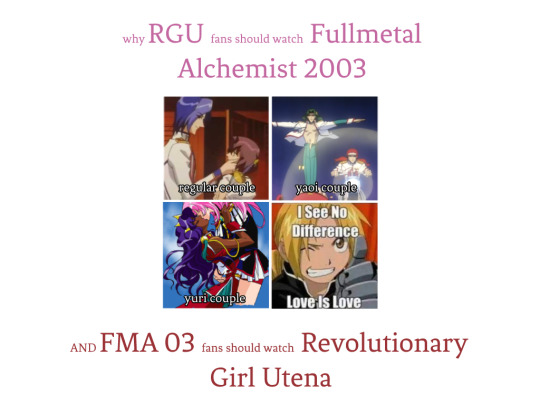
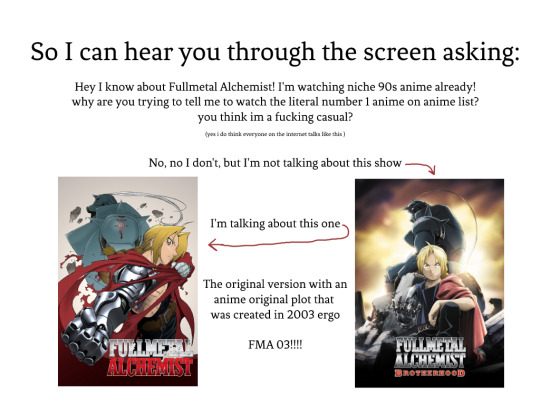
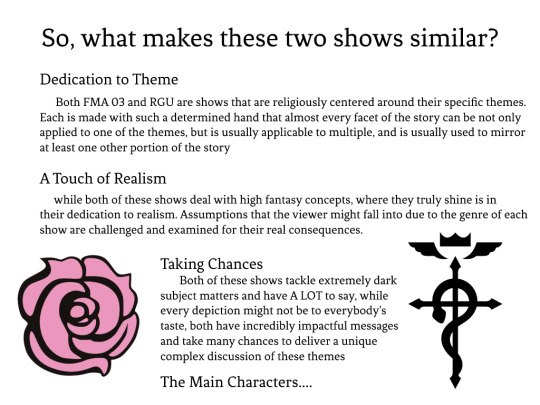
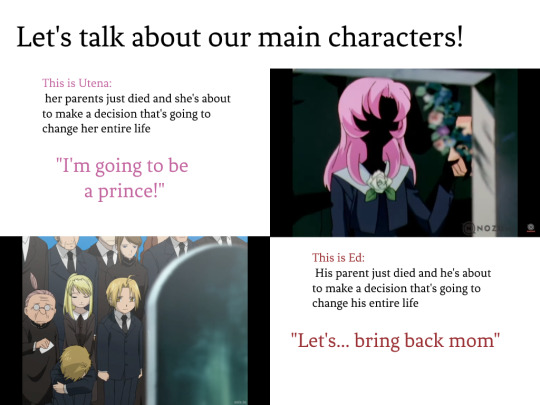
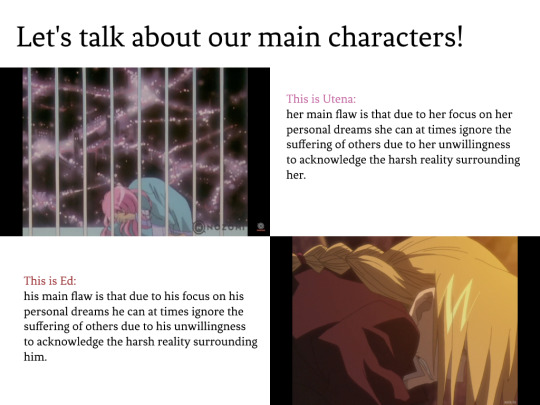
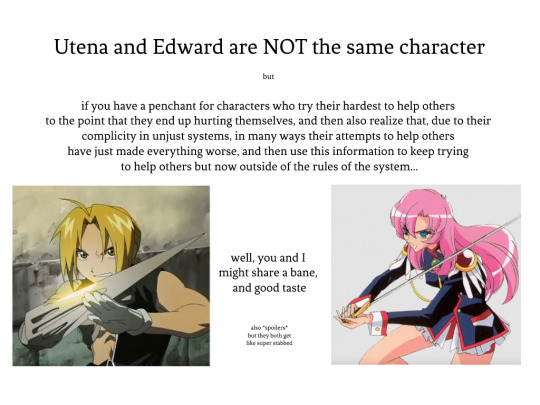
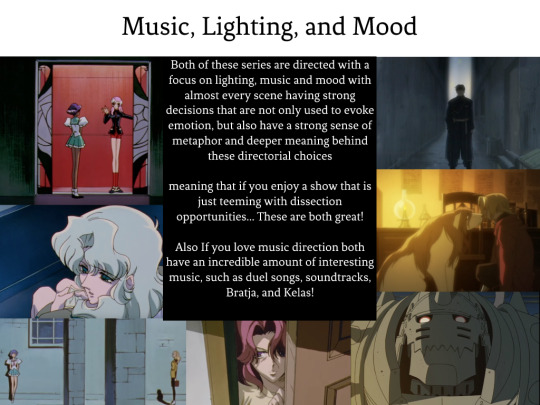
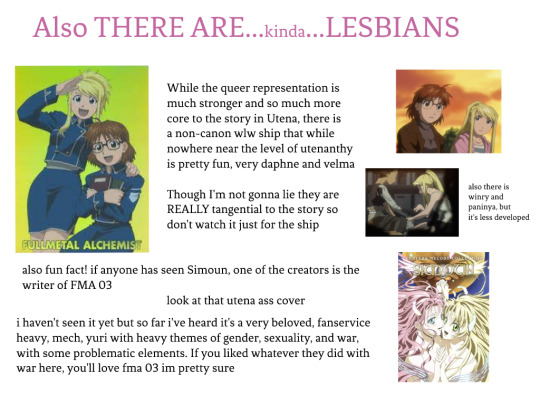
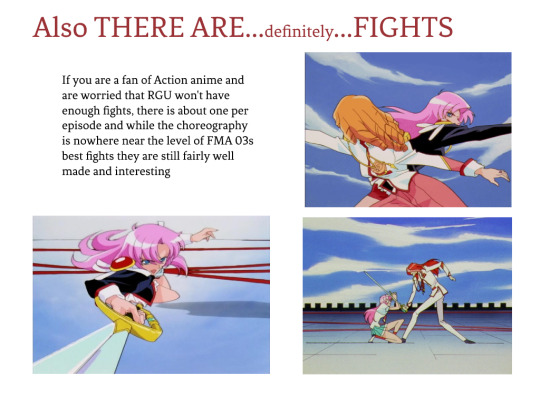
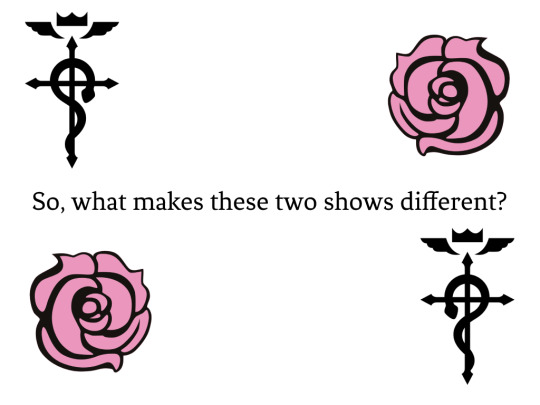
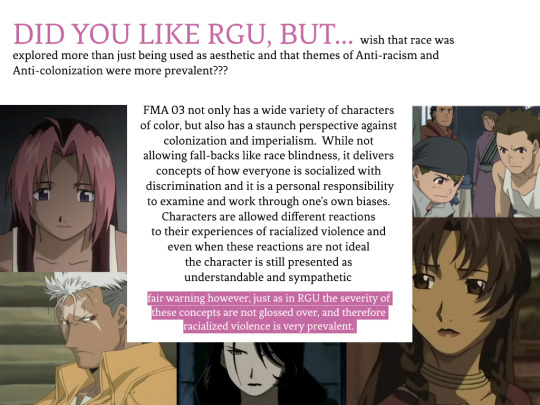
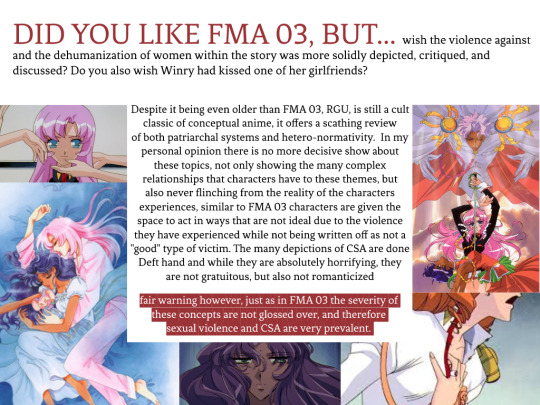
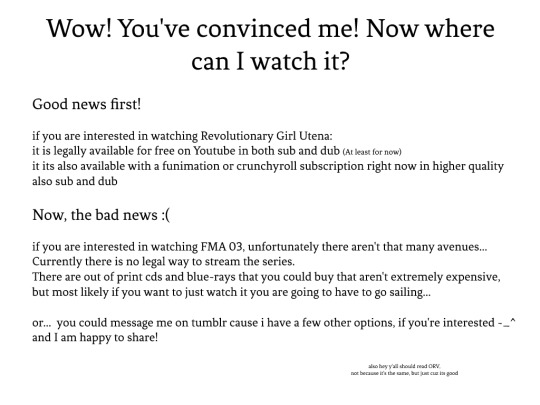
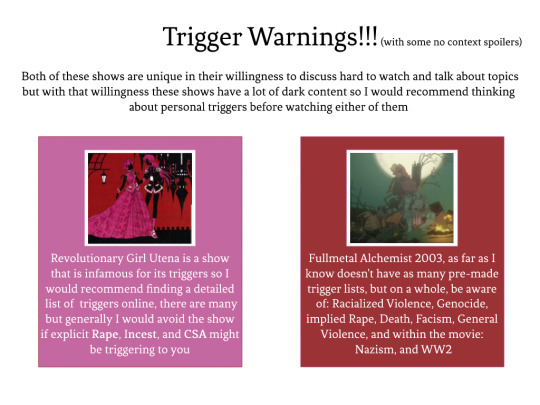
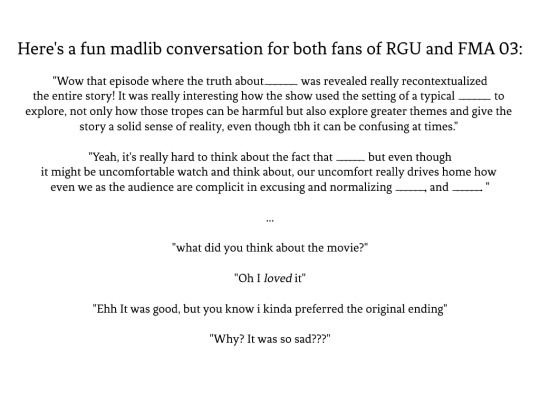
there's been a bit of rgu and fma comparison, so here's my dissertation on why they should kiss
#PLS TRY THE OTHER#I PROMISE THERE WILL BE SOMETHING INTERESTING IN THERE FOR YOU#also plsss if you last watched fma 03 on toonami years ago... give it another chance! Its pretty damn confusing#without missing episodes and not having watched it in years#utena tenjou#fma03#revolutionary girl utena#edward elric#fullmetal alchemist 2003#fma 2003#fma 03#rgu#and orv#are my holy trinity of media rn#im only not including orv bc its a different form of media and it has always felt more internal than the other two#I love orv but if you go in expecting societal themes you're gonna be surprised#but i think it has equal craftsmanship#sorry for orv proselytizing#but if you dont they take away your license#also i'll be honest this is really trying to get the rgu fans to watch fma the 12 fma 03 fans totally will watch rgu#but please rgu fans we're going extinct#and i know y'all would like it#also if you're interested in watching order#same for both series#show then movie#also if youre an 03 fan looking for the series feel free to message me too#my sister's review of this as someone who has watched and loved both:#everything you're saying is right... but the brainrot is unreal#simoun
234 notes
·
View notes